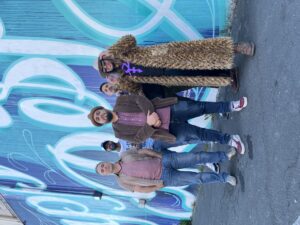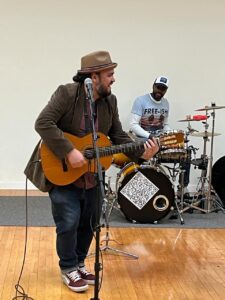by Ken Smith
posted Feb. 29
If not for some creative thinking on the part of its members, Chico’s Debajito could have been just another creative casualty of the COVID-19 crisis. An early incarnation of the group played just one show at Tender Loving Coffee before the virus – and accompanying shutdowns – struck our area. With the standard venues shuttered and indoor gatherings prohibited, the members of Debajito started their own pandemic-era scene.

“As soon as you could have gatherings outdoors, around the spring of 2021, we started having these ‘Backyard Boogies,’ which were outdoor, family-friendly parties with friends in backyards,” said front-man Pablo “Kee” Cornejo, who describes the band’s hard-to-pin-down sound as “multicultural, multi-instrumental music without borders.”
Post-pandemic, Debajito has been fueling increasingly crowded dance floors across Chico with energetic live shows. The band members’ diverse backgrounds and mosaic of musical influences are reflected in its fervent — and growing — cross-cultural fan base.
“The shows are really fun and lively, and the crowd gets pretty amped up,” bassist Austin Petersen said. Band members laughed as he recalled an ugly Christmas sweater party at Argus Bar + Patio they played last December: “By the end of the night people had been drinking quite a lot and it got wild. Someone fell on Pablo …”
“They chipped my tooth!” Kee interjected to more laughter before Petersen continued. “Some guy was riding around on someone’s shoulders with his shirt off, people were dancing and spinning their partners all over the place. I never expected anything like it before I started playing with these guys … this music really gets people going.”
Rising from Debajo del Agua
Kee explained Debajito’s name comes from his earlier band, Denver, Colorado-based Debajo Del Agua (“We called it Debajito because it’s a smaller version of Debajo del Agua,” he said.) Formed in 2007, that collective of musicians was a long-time staple of that city’s “artivist” scene and known equally for their live performances as their positive political messaging; in 2009, they were awarded a Global Justice & Peace Award from the Denver Justice & Peace Committee.
video por Ken Smith
Debajo del Agua was a family band in the truest sense, fronted by Kee and his two brothers, Dani and Elias, who traded vocals and rhymes in Spanish, English, Spanglish, Nahuatl and Portuguese. Their father, Pepe Cornejo, was also a founding member.
“My dad came to the States as an exile from Chile during the military dictatorship [of Augusto Pinochet] there,” Kee said. “He showed up with a bag of books and a bag of instruments. There were drums, pan pipes, and flutes all over the house and he taught me to play guitar and charango [a 10-stringed Andean cousin of the ukulele]. He was part of a musical movement of his generation, La Nueva Canción Latinoamericana.”
Nueva Canción was a political as well as musical movement that combined pro-democracy, leftist politics with folk-based music and socially-conscious lyrics, and provided a soundtrack for freedom fighters and activists in the Iberian Peninsula and Latin America from the mid-1960s through the ’80s. The elder Cornejo played in a band called Amincha in his native country, and Kee mentioned Quilapayún, Illapu, and Inti-Illimani as influential Chilean bands from the genre.

“So we grew up with all of that, but in the States, so I also loved hip hop and punk rock,” he continued. “We aren’t a punk rock band but you can feel some of that energy when we play live, and hip hop is part of our musical backbone.” Further describing Debajito’s influences, he mentioned Afro-indigenous influences from Columbia, various Caribbean styles, and cumbia, the latter of which he described as “the soundtrack of the Americas.”
Kee said Debajito’s current repertoire consists largely of Debajo del Agua songs, as well as some originals written together with Debajito’s current lineup and a handful of covers, including a few songs by Argentine ska legends Los Fabulosos Cadillacs.
Debajo del Agua’s socio-poitical values, Latin American pride, and positive vibes are also woven into the newer band’s DNA. Kee offered lyrics to the song Origen — a Debajo del Agua holdover regularly included in Debajo set lists — as an example of this ethos: “It’s an eternal search for peace in this mosaic on the pavement/So many shades of gray that I’ve strayed away from my station/In this constant transformation, desperately seeking salvation/Things are bound to change holding on tight to my foundation/Origen, holding on tight to my foundation.”
California cumbia, dirty Detroit snare, and violin from nowhere
In addition to Kee, Debajito’s line-up includes the aforementioned bassist Petersen and violin/mandolin player Peter Washington, both long-time Chicoans; Detroit transplant Wayne Moore (drum kit); and percussionist Luis Castillo (congas, bongos, cajon and more). Castillo said he lived all over South America before moving to the United States from Peru in 2014. Petersen and Moore played in rock and punk bands previously and Washington grew up playing classical music, and all three admit they had limited exposure to and experience playing Latin music before joining Debajito. Rather than being a detriment, the members agree this previous unfamiliarity is part of the key to the band’s uniqueness.
“California is a place where everybody from everywhere comes to mix, and you hear that when we play” — Luis Castillo
“We all have very different backgrounds, and what we each bring to the table makes our sound different from anything else,” Moore said.
“When we play cumbia, it’s like this one-of-a-kind, Debajito-style, California cumbia,” Kee said. “Like, Wayne brings in that Detroit, nasty, kicking snare, and it makes it a different flavor, then the violin brings in these melodic elements from out of nowhere. It’s taking all these things that don’t seem to go together and mashing them up to make something beautiful.”
“I’ve listened to cumbia my whole life, but what Wayne brings … it gives it this power I’ve never heard before,” Castillo added. “The combination of us playing together mixes everything up. California is a place where everybody from everywhere comes to mix, and you hear that when we play.”
Debajito has several live performances on its Facebook page. They’ve yet to record, but say they have at least an entire album’s worth of original material they’ve created together and plan to go into the studio soon. In the meantime, they have several live shows coming up, including with Valley Wolf (cumbia from Modesto) on March 2 at Duffy’s Tavern; Suika T and La Rüa (Mexico City) at Unwined Kitchen & Bar on March 29; and Duniya (Afro/world music from Nevada City featuring members from Mali and Trinidad) at Chico Women’s Club on Apil 13.
Ken Smith is a freelance writer and editor based in Chico.
(This story was produced with support from EMS’ Stop The Hate initiative, made possible with funding from the California State Library in partnership with the California Commission on Asian and Pacific Islander American Affairs.)
